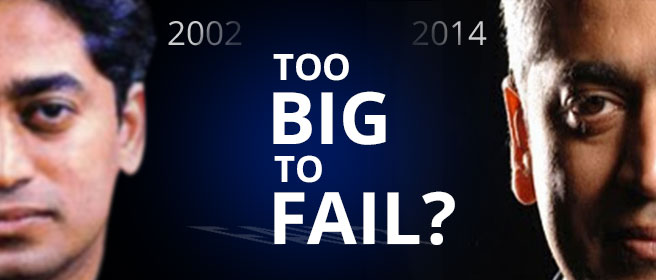Rajdeep Caught Out? Or Is He Too Big To Fail?

Anand Ranganathan sifts through the Rajdeep NL interview and comes up with some uncomfortable observations.
If one is honest about the riveting Newslaundry interview of Rajdeep Sardesai , one cannot help but draw the following conclusion:
Only Kissinger could have air-brushed his crimes better.
This simple, one-line conclusion may irk Mr Sardesai and his countless aficionados, for in truth he is yet to travel as far down the road to perdition as Kissinger, but it is one that sums up metaphorically Mr Sardesai’s defence best. It is also true that like Kissinger, Mr Sardesai is now too big to fail. He knows too much about too many people. Access begets excess. His Network is not a satire anymore; it is a way of life.
There are so many lies spoken by Mr Sardesai in the interview that it would require a considerable amount of time to catalogue them, like what Christopher Hitchens did magnificently for Kissinger. Perhaps viewers should go through the interview frame-by-frame and find back-references to the falsehoods that he utters nonchalantly, at times narcissistically. But let me illustrate just one that caught my attention soon as it was uttered. This was because I remember reading Mr Sardesai’s words to the opposite effect way back in 2002.
Complaining about the media is easy and often justified. But hey, it’s the model that’s flawed.
Pay to keep news free and help make media independent
In part I of the interview, when he is asked about the infamous action–reaction quote attributed to Mr Modi, Mr Sardesai says (at 17:25): “I have never used the words action-reaction for Modi at all”.
Mr Sardesai’s comment is in response to Madhu’s question whether the media was unfair to Mr Modi for cutting out the second part of the remark (which as it emerged years later was: “There should neither be an action nor a reaction”).
Mr Sardesai responds by saying: “That you should ask the TOI reporter who wrote that story. I have never used the words action-reaction for Modi at all”.
On March 7, 2002, Mr Sardesai wrote an article in The Indian Express titled: Did the media ransack shops, take lives, Mr Modi? What follows is a line from that article, quoted verbatim:
“The chief minister may have tried to push the Newtonian law by saying that every action invites a reaction, but for the media such comments only expose the state’s rather shameful attempt at rationalising the violence.”
This article subsequently appeared in the book The Gujarat Carnage edited by Asgharali Engineer (page 413), and in Gujarat, the Making of a Tragedy edited by Siddharth Varadarajan (page 278).
There are other falsehoods and self-aggrandizing, patronising remarks that Mr Sardesai utters in the interview that can be countered by his own words, spoken and written. But this will take time and effort, and whether it would be a fruitful exercise is itself debatable. Cash for votes, tyranny of distance, running caste polls, going selectively soft on some while coming down hard on others, running unverified stings while not showing one’s own by saying it’s not been verified yet, running false exclusives, saying off-the-record is exactly that but then bringing it on-the-record in one’s book – the list is endless. It is almost as if we have grown up with Mr Sardesai’s misdemeanours and in return they have, in some macabre way, grown on us, and now it is pointless to point them out. No good will come of it. For this reason very few in the media dare to criticise their own. They probably think it is unfair to criticise a journalist. But what happens when a journalist wakes up one day and finds himself metamorphosed into a politician? Is he still kosher? Why was it that Tarun Tejpal’s financial and other sordid dealings started to get exposed by his colleagues only after, not before, he was arrested? Were his devious transactions, his twilight financial bunglings not known to his peers earlier?
Mr Sardesai wants to be beyond criticism not only because he is, as he puts it, a mere messenger, but also because he says so in the interview: “I am wary at what organisations like Newslaundry do.” What he fears is the following: that he might have turned into a person he has spent his entire life deriding – a politician, and he gives away his subconscious abhorrence of what he has become, by repeating ad nauseam that he is into his 26th year of journalism. I am a journalist. I am not anyone else. I am not a trader, I am not a wheeler-dealer, I am not a politician. I. Am. A. Journalist.
Indian media has turned into a game of musical chairs, but with a difference: When the music stops no one removes a chair. There is no attrition for those who are too big to fail but, rather, always a warm, welcoming padded cushion when the music starts again. Besides, Indian journalists are notorious for not accepting their errors and mistakes, and when they do, they always regret them, never apologise for them. Thankfully, Mr Sardesai is different. As he says in what is his 26th year of journalism: “In my 26 years of journalism, one is allowed to get burnt once”.
This article first appeared in newslaundry on Nov. 11, 2014.